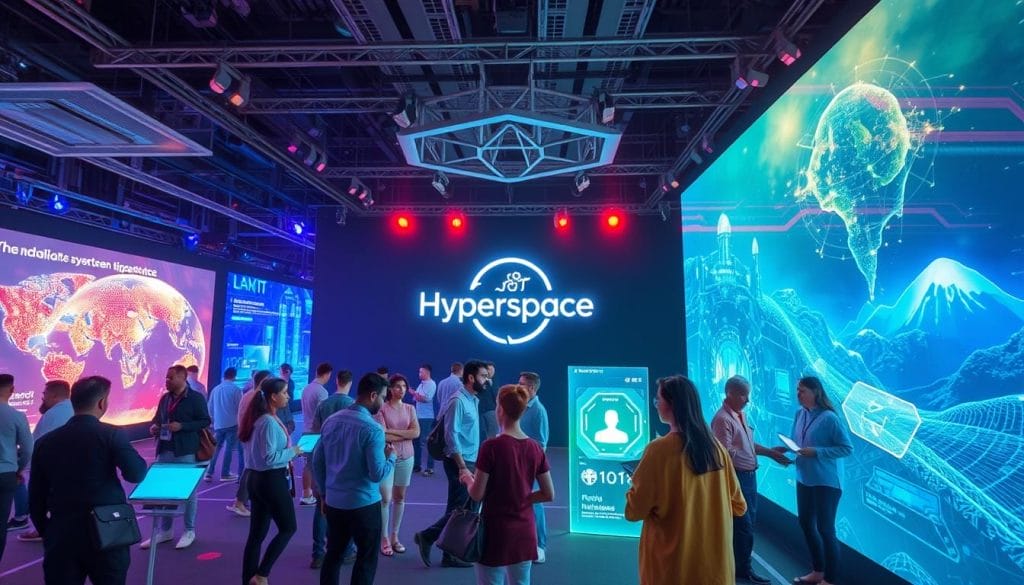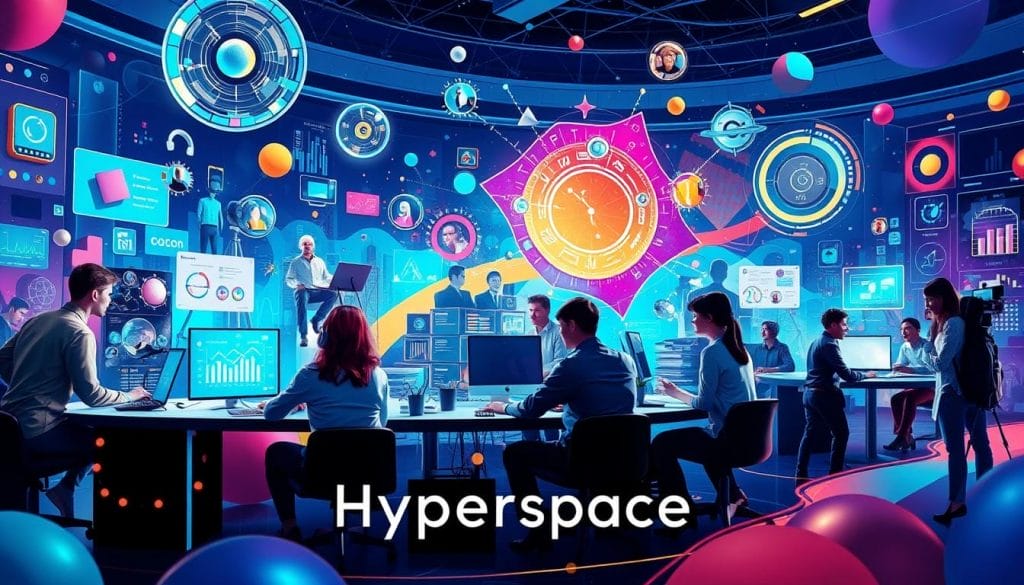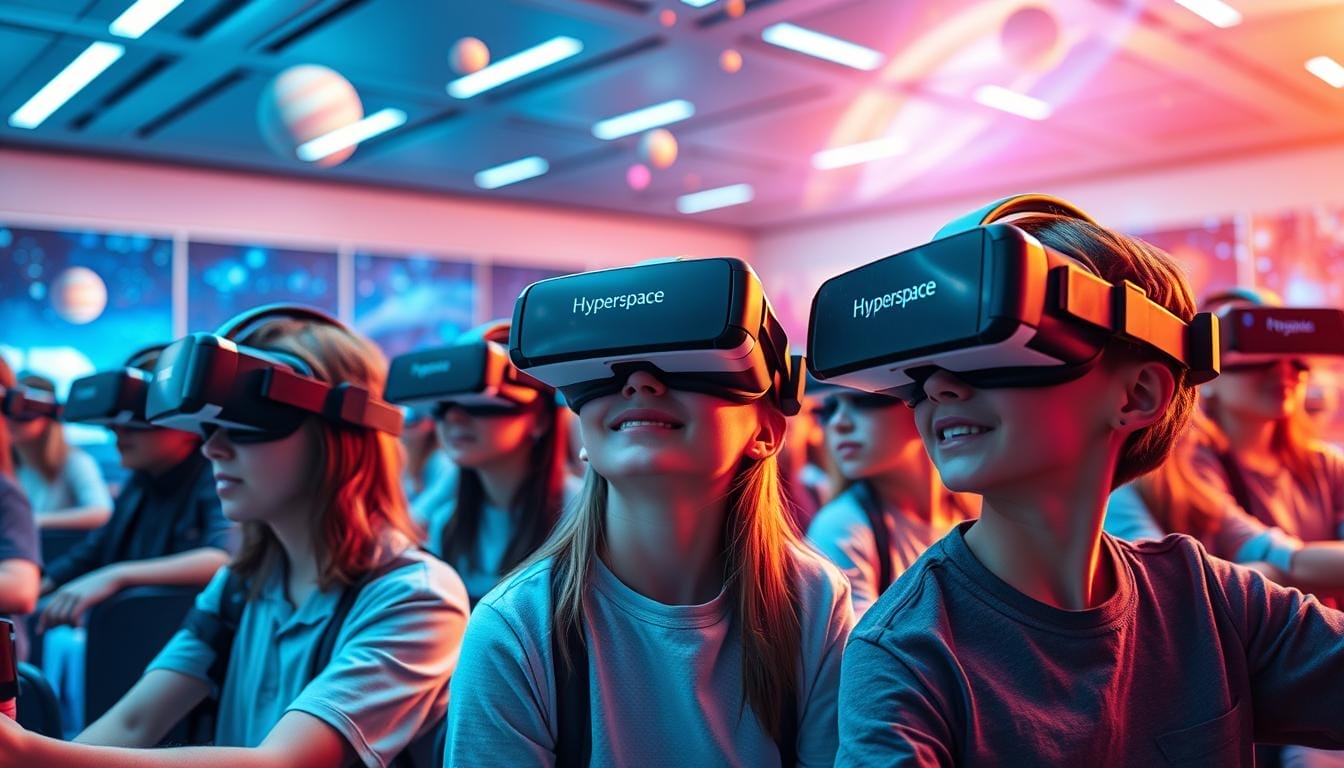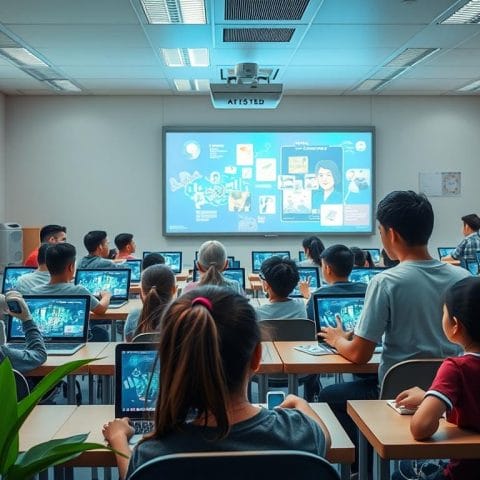AI-powered virtual events are changing how we learn and grow at work. They mix artificial intelligence with online learning, making it better. Hyperspace leads this change with tools that help businesses grow their teams.
Hyperspace’s events blend human creativity with AI. They offer a place where everyone can share ideas and learn fast. With tools like simulations and interactive scenarios, Hyperspace makes learning fun and accessible for all.
Key Takeaways
- AI-powered virtual events use artificial intelligence to improve teamwork skills.
- Hyperspace offers tools that help businesses grow their teams.
- These platforms help people share ideas, learn quickly, and fill skill gaps.
- Tools like simulations and interactive scenarios are available for learning.
- AI-powered events are changing how we learn and grow, making it more collaborative and effective.
What Are AI-Powered Virtual Events?

AI-powered virtual events are new online meetings that use artificial intelligence to improve learning and teamwork. They are more than just webinars or video calls. They include AI as part of the event to make it more interactive. This way, virtual events can offer customized learning paths, instant feedback, and better networking chances.
Key Features of AI Integration
The use of AI in virtual events adds several important features:
- Real-time Assistance: AI chatbots and virtual helpers give quick support, answering questions and helping out during the event.
- Efficient Collaboration: AI helps find meaningful connections among participants, leading to valuable discussions and networking.
- Personalized Learning Experiences: AI analytics create learning paths that match each person’s needs and interests.
- Comprehensive Data Analysis: AI collects and analyzes data, giving organizers insights to improve the event.
Examples of AI Tools in Use
AI technology is used in many ways in virtual events, such as:
- Autonomous AI avatars that talk naturally and change their behavior based on how people interact with them.
- Context-aware AI assistants that give relevant info and tips when asked.
- Dynamic AI moderation tools that keep discussions on track and inclusive.
- AI content creation that makes personalized summaries, follow-ups, and reports after the event.
By combining human skills with AI, these events offer a new way to learn, connect, and solve problems in industries.
The Importance of Collaborative Skill Development

In today’s fast-changing world, working together to learn is key. It helps both people and companies reach their best. With AI, personalized skill development pathways and virtual mentoring programs, everyone can find their own path to success.
Benefits for Individuals
Learning together boosts thinking, solving problems, and seeing different views. AI-driven skill assessments help find what you’re good at and what you need to work on. Being part of group talks and projects sharpens your communication and teamwork skills, essential for today’s jobs.
Advantages for Organizations
Companies that value teamwork do better in communication and adaptability. Working together brings new ideas and a culture of innovation. AI helps match employee skills with what the job market needs, making sure the team is ready for the future.
Aligning Skills with Industry Needs
AI in learning gives insights into what’s needed in the job market. This helps learners get the skills needed for today’s jobs. It keeps them ahead and helps companies stay competitive in a changing work world.
“Collaborative learning is the key to unlocking the full potentia of individuals and organizations in the digital age.”
As we move towards a future where humans and machines work together, learning for life is more important than ever. AI and virtual mentoring programs help build a diverse and flexible workforce. This team is ready to succeed in the ever-changing job landscape.
How AI Enhances Virtual Event Experience
AI-powered virtual events are changing how we learn together. They use advanced tech to offer a new kind of experience. This is different from old webinars or online meetings.
AI helps make learning paths that fit each person. It looks at what you like and how you learn. This way, you get content that really matters to you.
This makes learning fun and keeps you interested. You feel like you’re playing a game while you learn. It’s a gamified learning experience that keeps you going.
Real-Time Feedback and Analytics
AI also gives real-time feedback and analytics during events. It tracks how you’re doing and what you’re learning. This helps organizers make the event better for everyone.
They can change things up if needed. This keeps the AI-powered virtual events focused on helping you grow.
Enhanced Networking Opportunities
AI also makes networking better. It uses smart matching to connect you with others. This helps you find people who share your interests and skills.
Virtual events become places where you can learn and grow. They’re not just about meeting people. They’re about building skills and sharing knowledge.
Hyperspace uses AI to create gamified learning experiences in their AI-powered virtual events for collaborative skill development. They offer personalized learning, feedback, and networking. This changes virtual events, helping you reach your goals.
Types of AI-Powered Virtual Events
AI-powered virtual events come in many forms. They are made for different learning goals and what people like. You can find everything from immersive webinars to big conferences and small networking sessions. These events use artificial intelligence to make the experience better.
Webinars and Workshops
Webinars and workshops are great for learning by doing. They use AI to help with audience interaction and checking understanding. This makes learning more effective and fun.
Speakers can adjust what they teach based on who’s watching. They can also use AI to make the event more lively. This makes the experience better for everyone.
Conferences and Panels
AI helps make conferences and panels better too. It manages questions, translates languages, and suggests content. This makes the event more enjoyable and useful.
People can meet experts and find new connections. There are special areas for networking and virtual booths. AI helps match people with similar interests.
Networking Sessions
Networking is key in virtual events, and AI helps a lot. It matches people based on what they’re interested in. This leads to interesting conversations.
AI also helps start conversations and creates places for people to meet. This makes it easier to connect and share ideas.
AI makes virtual events better for learning and connecting. It offers online learning platforms, virtual training environments, and interactive skill-building tools. People get a personalized experience that helps them grow professionally and build connections.
“AI-powered virtual events are the future of learning and collaboration, where technology transforms the way we acquire new skills and build meaningful connections.”
Best Practices for Hosting AI-Powered Events
Hosting successful AI-powered events needs careful planning and execution. Use new technologies and tools to keep participants engaged. This makes learning fun and helps them grow skills after the event. Learn how to host great AI-powered events with remote collaboration technologies, digital experiences, and personalized learning paths.
Engaging Participants Effectively
Use AI to make your event personal for each participant. Chatbots and virtual assistants can offer tailored advice and help. Add fun polls, quizzes, and games to keep everyone involved and learning.
Utilizing Interactive Tools
Use AI tools to make your event interactive. Set up virtual rooms for group talks and solving problems. Use whiteboards and Q&A systems to make sharing ideas easy and fun.
Follow-Up Strategies for Learning
Keep learning going after the event with AI. Send out personalized learning plans and track progress. Use AI to help participants grow and learn more.
“By embracing AI-powered technologies and interactive tools, event organizers can create immersive digital experiences that drive meaningful skill development and collaborative learning for participants.”
Follow these tips to make your AI-powered events better. Engage participants, use tools well, and keep learning going. AI can make your event more engaging and help participants grow.
Metrics for Measuring Success
Measuring success in AI-powered virtual events needs a detailed approach. It looks at many metrics. By tracking these, companies can understand how well their skill development works. They can then make better choices for improvement.
Participant Engagement and Feedback
AI analytics can show how much people engage. It looks at how long they stay, what they do, and if they finish. Also, getting feedback right away helps know if people like the event and find it useful.
Skill Acquisition Tracking
AI can check if people are getting better at certain skills. This tracking shows if virtual mentoring and games are working. It helps see if the skills needed are being developed.
Return on Investment Analysis
Looking at the ROI of AI events means checking if they save money and improve work. It’s about seeing if the benefits are real. This shows the value of using AI for learning and helps keep investing in it.
| Key Performance Indicator | Description |
|---|---|
| Participant Engagement | Measures interaction levels, time spent on activities, and completion rates |
| Skill Acquisition Tracking | Assesses progress and mastery of specific competencies |
| Return on Investment | Analyzes factors like improved productivity, reduced training costs, and enhanced employee performance |
Using different metrics helps understand the success of AI events. It shows how well they work for learning and improving. This helps make better plans for learning and getting better results.
Future Trends in AI-Powered Events
The future of AI-powered virtual events for collaborative skill is exciting. Virtual reality will make online learning more real and engaging. AI tools will help everyone learn, no matter their style or ability.
AI will get better at personalizing learning and understanding language. These changes will make learning more effective. They will help us grow in a world where AI is key.
Innovations in Virtual Reality
Virtual reality (VR) is changing how we experience AI events. VR will make us feel like we’re there, making learning more fun and interactive. New tech will make the experience even more real.
Growing Emphasis on Inclusivity
The future of AI events will focus on making everyone feel included. AI will help with things like captions and language translation. This will make learning better for everyone.
Evolution of AI Capabilities
AI will keep getting better, making events more advanced. We’ll talk to virtual assistants more naturally. Predictive analytics will help plan events better.
Machine learning will make learning more personal. It will change based on how we use it. This will make learning truly unique for each of us.
“The future of AI-powered virtual events will be defined by the seamless integration of immersive technologies, inclusive design, and the continuous evolution of AI capabilities. This convergence will redefine the way we approach collaborative skill development, empowering learners to thrive in a world where AI is an essential tool for personal and professional growth.”
Real-World Case Studies
AI-powered virtual events are changing many industries. They help teams learn new skills better. Companies are using these tools to train staff in many fields, from customer service to space missions.
Transforming Customer Service and Healthcare Training
Verizon used VR to train their customer service team. This made them handle tough calls better. GE Healthcare also used VR to train radiographers faster, improving their work.
Enhancing Employee Engagement and Confidence
Vodafone’s VR training was a hit with employees, who loved it. Bank of America’s VR program made staff more confident in their skills. This boosted their enjoyment of training.
Improving Precision and Productivity
Surgeons trained with VR were much better than those who didn’t. Intel’s VR course showed a big return on investment. Boeing used VR to make astronauts’ training more precise.
Transforming Education Through AI
In education, AI is making a big difference. Georgia Tech’s AI assistant helped students faster. The University of Alicante’s app made campus more accessible for visually impaired students.
These examples show how AI can change the way we learn and work. By using new tools and experiences, teams can get better at their jobs than ever before.
| Industry | Use Case | Key Outcome |
|---|---|---|
| Telecommunications | Verizon’s VR training for customer service | Significantly improved calmness levels during difficult customer conversations |
| Healthcare | GE Healthcare’s VR training for radiographers | Increased CT scanner operational time and real-time data collection for feedback |
| Finance | Bank of America’s VR training program | 97% confidence level among employees in applying learnings |
| Technology | Intel’s VR Electrical Safety Recertification course | 5-year ROI of 300% and 94% of trainees interested in more VR training |
| Aerospace | Boeing’s VR training for astronauts | Enhanced precision in docking procedures for crewed space missions |
| Education | Georgia Tech’s “Jill Watson” AI teaching assistant | Reduced response time for student queries, allowing human TAs to focus on complex needs |
| Education | University of Alicante’s “Help Me See” application | Improved student engagement and participation for visually impaired students |
These stories offer lessons for companies wanting to use AI for learning. They show how new tools and experiences can change the way we work and learn.
Getting Started with AI-Powered Virtual Events
To start using AI in your virtual events, pick the right platform. Hyperspace is a great choice. It has cool features like personalized learning paths, AI tests, and virtual mentors.
Choosing the Right Platform
Look for a platform with deep AI features. It should have tools for teamwork and make learning fun. Check if it can understand your data, suggest learning plans, and give feedback right away.
Formulating a Collaborative Learning Strategy
Make a plan that uses AI well. Keep learning human and let AI help. It should make content fit each person, make things easier, and help people talk to each other.
Tips for Continuous Improvement
Keep track of how well your events are doing. Look at how people are doing, how much they learn, and if it’s worth it. Listen to what people say and keep up with new AI tech. This way, your events will always be good and meet your audience’s needs.
FAQ
Q: What are AI-powered virtual events?
A: AI-powered virtual events are online meetings that use artificial intelligence. They make learning and talking more interactive. AI helps by giving real-time help, making teamwork better, and tailoring learning to each person.
Q: How does AI enhance the virtual event experience?
A: AI makes online events better by creating learning paths just for you. It also gives feedback and helps improve things. Plus, AI helps people meet and connect in new ways.
Q: What are the different types of AI-powered virtual events?
A: There are many kinds of AI-powered events. You can find webinars, workshops, conferences, and more. These events use AI to make learning fun and effective.
Q: What are the best practices for hosting AI-powered virtual events?
A: To host great AI-powered events, make things interactive and fun. Use tools like virtual rooms and AI Q&A systems. Also, follow up with personalized learning plans and skill checks.
Q: How can the success of AI-powered virtual events be measured?
A: Success can be measured by looking at how people engage and learn. Track skills and see if it’s worth it. This helps make future events even better.
Q: What are the future trends in AI-powered virtual events?
A: The future looks bright with more virtual reality and focus on everyone being included. AI will get smarter, making learning even more personal. These changes will make learning together even better.
Q: How can organizations get started with AI-powered virtual events?
A: Start by picking the right platform for your needs. Then, plan how you’ll use AI for learning. Always look for ways to improve and keep up with new AI in education.





